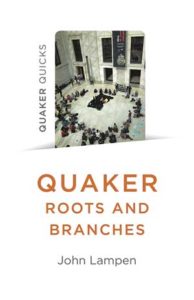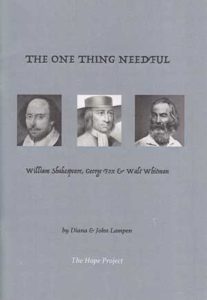Quaker Roots and Branches AND The One Thing Needful
Reviewed by Mitchell Santine Gould
November 1, 2018
 Quaker Roots and Branches
Quaker Roots and Branches
By John Lampen. Christian Alternative, 2018. 64 pages. $10.95/paperback; $5.99/eBook.
The One Thing Needful: William Shakespeare, George Fox & Walt Whitman
By Diana and John Lampen. The Hope Project, 2017. 27 pages. $7/pamphlet.
Throughout many years, Diana and John Lampen have contributed to conflict resolution in Northern Ireland, South Africa, Yugoslavia, and the former Soviet Union. John is the author of Mending Hurts and some Pendle Hill pamphlets. These two new booklets are the Lampens’ attempt to mine the lessons of Quaker history for guidance concerning the grave and manifold crises that now confront the human race. “The symptoms are undeniable,” write the Lampens, citing pollution, water wars, depletion of mineral reserves, among others. Although the subject matter differs, Quaker Roots and Branches and The One Thing Needful are both sufficiently provocative to inspire further reflection, despite the free-wheeling, overly ambitious scope of such slim essays. Roots and Branches covers the environment; war and peace; punishment; “the arts, especially music”; and “experience, belief, and theology” in 64 pages. In a mere 27 pages, One Thing Needful covers themes treated in the writings of George Fox, William Shakespeare, and Walt Whitman: deceit, love, justice, war, politics, mercy, forgiveness, and the Light Within.
Is there anything that Quakers in particular can contribute to the search for solutions? There are many Friends, say the Lampens, following Fox’s rejoinder to act as society’s “patterns,” who “are living in a way which shows that there can be an alternative.” This tradition of ecological consciousness dates to the time of William Penn, who described our world as a “rare and sumptuous palace [furnishing] groves, plains, valleys, hills, fountains, ponds, lakes, and rivers,” which sustain cities and agriculture, and who called upon us to recognize “what careless and idle servants we are, and how short and disproportionate our behaviour is to [H]is bounty and goodness.” British abolitionist Thomas Clarkson was struck by the kindness Quakers displayed to their own animals, and by their aversion to hunting and hawking, concluding, “Quakers are of opinion that rights and duties have sprung up—rights on behalf of animals and duties on the part of men.” In 1772, John Woolman specifically laid the blame on capitalism: “So great is the hurry in the spirit of this world that in aiming to do business quick and to gain wealth, the creation at this day doth loudly groan.” Given the gravity of the other issues, John Lampen’s inclusion in Roots and Branches of the obsolete Quaker ban on music may seem frivolous or indulgent, but a careful reading of this section suggests a compelling parallel between that early, admittedly misguided, urge to reduce the distractions of the era’s light entertainment and very modern concerns about exposure to sex, violence, materialism, and propaganda in mass media, not to mention the hypnotic trance of electronic screens.
 One Thing Needful is clearly inspired by Whitman’s 1888 deathbed essay on George Fox, which at one point attempted to compare and contrast Fox with Shakespeare. Unfortunately, that essay serves as a particularly ill-advised inspiration for the Lampens, given that it is tenuous, rambling, and unfocused. Although the authors do not address the complex question of whether Whitman was indeed a Quaker (and the subtle truth is Walt Whitman was far too good of a Quaker to be a Quaker), they acknowledge that he was “preoccupied with the deepening of our spiritual lives,” and “encourage[d] us to look at two authors whom he saw as pioneers” in understanding human nature.
One Thing Needful is clearly inspired by Whitman’s 1888 deathbed essay on George Fox, which at one point attempted to compare and contrast Fox with Shakespeare. Unfortunately, that essay serves as a particularly ill-advised inspiration for the Lampens, given that it is tenuous, rambling, and unfocused. Although the authors do not address the complex question of whether Whitman was indeed a Quaker (and the subtle truth is Walt Whitman was far too good of a Quaker to be a Quaker), they acknowledge that he was “preoccupied with the deepening of our spiritual lives,” and “encourage[d] us to look at two authors whom he saw as pioneers” in understanding human nature.
A typical example of the Lampens’ manner is their treatment of mercy in the works of Shakespeare and Fox. King Lear exclaims, “Expose thyself to feel what wretches feel, / That thou mayst shake the superflux to them / And show the heavens more just.” Likewise, Fox preached to the merchants of London: “Spare one of your dishes, and let it be carried to the place for the poor, and do not make them to come begging for it either . . . consider what abundance of riches is in this city, and what good you might do with it.” They conclude this section with a touching quotation from Fox, which really reveals the unique spirit of Quakerism: “At another place they . . . said that if they had enough money they would hire me. So I said it was time for me to go away, for then they would not come to their own [Inward] Teacher.”



Comments on Friendsjournal.org may be used in the Forum of the print magazine and may be edited for length and clarity.